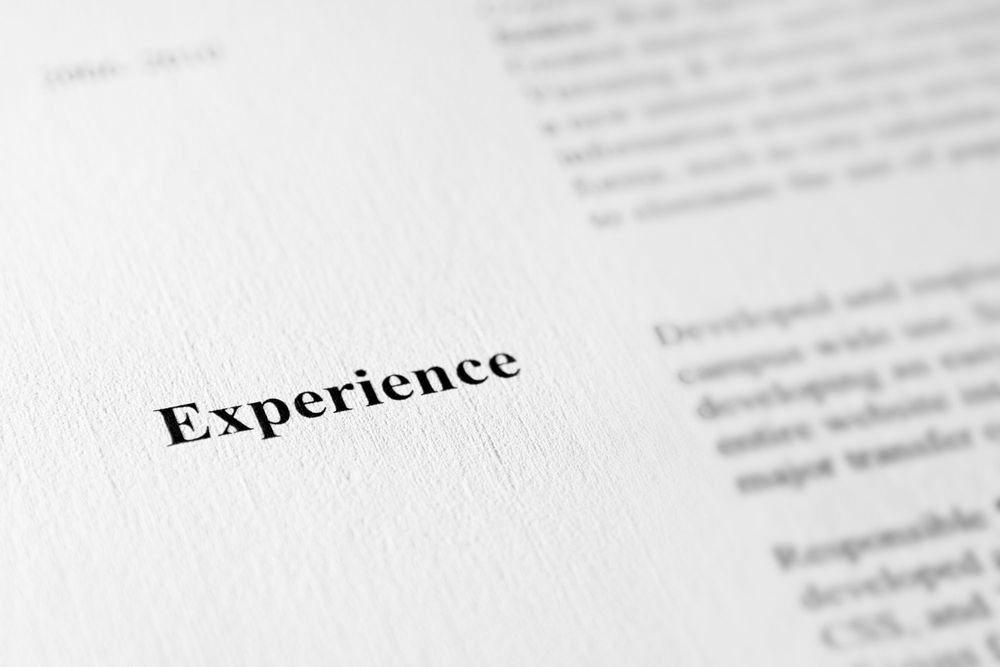
People make it sound simple to write a resume. For instance, a colleague might tell you to just include your work history, achievements, and objectives. But resume writing is more like an art form than a writing exercise. Getting your resume right is a challenging task, and it means perfecting the work experience section of the document. Learn more about how to write the work experience section and what you can do to make it better.
People usually write experience sections in description format. You may even copy the description verbatim from a job listing. Unfortunately, this won't earn you any points. You should go into details about the job and be clear about how it relates to the job you want.
Speak about some of the duties you had, and do so in an engaging tone. If you just give a general, boring description of your job title, your employer won't pay much attention to it.
Your resume is a way to show prospective employers your true value. If you don't have a work experience section that demonstrates your assets and value as an employee, you probably won't get called in for an interview.
In this section, be sure to emphasize your achievements and mention any noteworthy points. Rather than recite your job duties, think about how you can use your previous work experience to highlight what makes you a great candidate for the position.
Adjectives are fantastic, but they will only get you so far on your resume. You could use the most flowery adjectives available, yet an employer has no reason to believe what you say and nothing tangible to back up your statements.
Think about the two following examples. In the first resume, an applicant might say, "Significantly increased workplace productivity between 2015 and 2017." The second resume might say, "Increased workplace productivity by 15% between 2015 and 2017." As an employer, which resume would you prefer? It's likely you would choose the second resume because it was more specific.
Whenever possible, use numbers to quantify your statements. You may not always be able to do this, but try to make it happen when you can. Even if your employer doesn't track statistics, you should keep track of them yourself. When the time comes to find a new job, you can use your data in your resume.
PAR is an acronym that stands for Problem Action Results. Before you start to write your resume, take some time to think about the problems you encountered in the workplace. Then, focus on what you did to overcome the obstacles. Finally, make a note of the end result.
Write down a few examples of PAR, and pick out the ones that apply the most to your desired position. Be sure to include the most impressive examples as well.
One of the most effective resume writing strategies involves starting with the result and working your way backward. So, after using the PAR method to come up with problems, actions, and results, list your results first.
For example, you might say, "Set a sales record of $2 million by changing the structure to increase collaboration in the workplace." The hiring manager is more likely to notice and remember the impressive goal when you list it first.
You could use bullet points to describe your work history. However, this isn't the best way to impress your hiring manager. Bullet points belittle your accomplishments and tend to blur everything together.
By using a more narrative style, you also harm yourself. An employer doesn't want to read a novel about your last job. They want to be able to scan your resume and see the highlights. To accomplish this, you should use a combination approach.
Use bullet points to list your most important contributions with an employer, but give a paragraph about the position before the bulleted list. This format tends to be extremely readable, and could be the reason you get a response from the employer.
Every time you apply for a job, make sure you tailor the resume for the position. While you may keep all the same employers in your work section, you should focus on different duties and accomplishments.
To make your life easier, you may want to save a few resumes. One might be for more sales-focused jobs, while another is for management. Even so, you should still check over your resume before sending it out and customize it as needed.
Because your resume is relatively short, every word matters. Don't use boring and stale terms or phrases. Instead, use action verbs and phrases that catch attention.
Certain phrases to avoid include "responsible for" and "daily duties." Think of ways to make your resume a little more unique and enticing.
Although it's common for job applicants to lie about their experience, doing so comes at a cost. Eventually, the lies catch up to you. A hiring manager may be able to see through your lies, and you can be sure that the deception will keep you from a job offer.
Embrace the honest approach. If you don't have all the qualifications for a job, be upfront about it. Explain that you're still an excellent candidate for the position.
After you write your work history, ask a trusted colleague or mentor to read it. You can read the section over 100 times, but you may not know what to look for.
When you have an experienced individual read your resume, they can offer constructive criticism. You might find out you used too many stale phrases or that your work history was difficult to read. In any case, you can use the criticism to adjust your resume as needed.
Lorem Ipsum is simply dummy text of the printing and typesetting industry. Lorem Ipsum has been.
